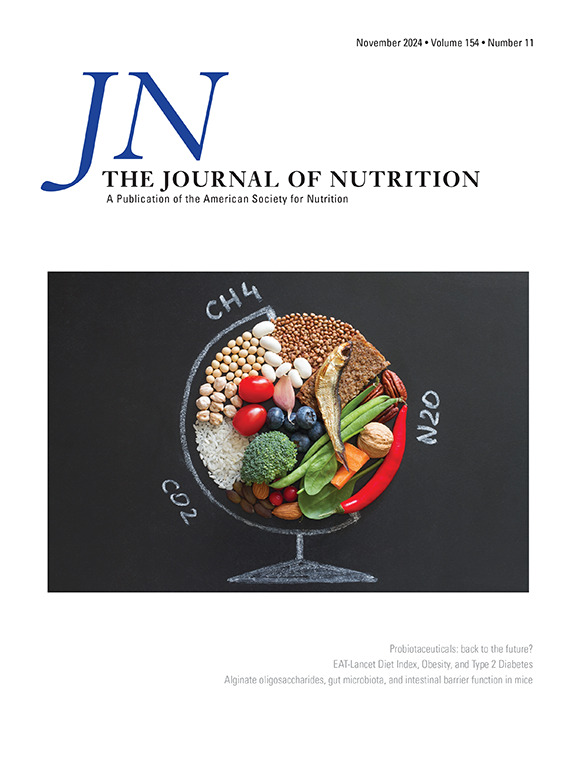A Metabolome Wide Association Study of Fruit and Vegetable Consumption and Associations with Cardiovascular Disease Risk Factors: The International Study of Macro-/Micronutrients and Blood Pressure (INTERMAP) Study
IF 3.7
3区 医学
Q2 NUTRITION & DIETETICS
引用次数: 0
Abstract
Background
Epidemiologic evidence linking blood pressure (BP) and body weight-lowering effects with fruit and vegetable consumption mostly relies on self-reported dietary assessment prone to misreport and under- or overestimation of relationships.
Objectives
We aimed to characterize objective 24-h urinary metabolites and a derived metabolite score associated with fruit and vegetable intake and assessed their associations with BP and BMI, with validation across cohorts.
Methods
We used untargeted proton nuclear magnetic resonance spectroscopy (1H NMR) of 2 timed repeated 24-h urine collections from free-living participants from the US (n = 2032) and the UK (n = 449) of the cross-sectional International Study of Macro-/Micronutrients and Blood Pressure (INTERMAP). We evaluated correlations between fruit and vegetable intake assessed by 24-h dietary recalls with 7100 1H NMR features, adjusted for confounders and multiple testing. We related identified metabolites and a metabolite score with BP and BMI using extensively adjusted multiple linear regression models.
Results
We characterized 11 1H NMR-derived 24-h urinary metabolites related to fruit and vegetable intake, reproducible across multiple 24-h urine collections of both cohorts. Proline betaine, citrate, N-methylproline, scyllo-inositol, 2-hydroxy-2-(4-methyl cyclohex-3-en-1-yl) propoxyglucuronide, and proline were associated with fruit intake, specifically with Rutaceae intake, whereas S-methyl-L-cysteine sulfoxide and S-methyl-L-cysteine sulfoxide metabolite were associated with Brassicaceae intake. The metabolite score, explaining 39.8% of fruit and vegetable intake, was inversely associated with systolic BP [−1.65 mmHg; 95% confidence interval (CI): −2.68, −0.62; P < 0.002] and BMI (−1.21 kg/m2; 95% CI: −1.62, −0.78; P < 0.0001). These associations were, to a large extent, explained by urinary citrate excretion.
Conclusions
We identified 1H NMR-derived urinary metabolites associated with fruit and vegetable consumption, consistent and reproducible between urine collections and across populations. A higher fruit and vegetable-related metabolite score showed associations with lower systolic BP and BMI, mainly mediated by citrate, but would need confirmation in further studies.
关于水果和蔬菜消费量及其与心血管风险因素关系的全代谢组关联研究:INTERMAP 研究。
背景:将血压(BP)和体重降低效果与水果和蔬菜摄入量联系起来的流行病学证据大多依赖于自我报告的饮食评估,这种评估容易出现误报以及低估或高估两者之间的关系。我们描述了与水果和蔬菜摄入量相关的客观 24 小时尿液代谢物和衍生代谢物评分,并评估了它们与血压和体重指数(BMI)的关系,同时在不同队列中进行了验证:我们使用非靶向质子核磁共振波谱(1H NMR)对来自美国(人数=2,032)和英国(人数=449)的 "国际宏观/微量营养素与血压研究"(INTERMAP)横断面自由生活参与者的 24 小时尿液进行了两次定时重复收集。我们评估了通过 24 小时膳食回顾评估的水果和蔬菜摄入量与 7100 个 1H NMR 特征之间的相关性,并对混杂因素和多重测试进行了调整。我们使用广泛调整的多元线性回归模型,将已确定的代谢物和代谢物评分与血压和体重指数联系起来:我们确定了与水果和蔬菜摄入量有关的 11 种 1H NMR 衍生 24 小时尿液代谢物的特征,这些代谢物在两个队列的多次 24 小时尿液采集中均具有重现性。脯氨酸甜菜碱、柠檬酸盐、N-甲基脯氨酸、鞘氨醇肌醇、2-羟基-2-(4-甲基环己-3-烯-1-基)丙氧基葡萄糖醛酸苷和脯氨酸与水果摄入量有关,特别是与胡芦巴科植物的摄入量有关,而 S-甲基-L-半胱氨酸亚砜和 S-甲基-L-半胱氨酸亚砜代谢物与十字花科植物的摄入量有关。代谢物得分占水果和蔬菜摄入量的 39.8%,与收缩压成反比(-1.65 mmHg;95% 置信区间(CI):-2.68,-0.62,P2;95% CI:-1.62,-0.78,PC):我们发现了与水果和蔬菜摄入量相关的 1H NMR 衍生尿液代谢物,这些代谢物在不同尿液采集和不同人群中具有一致性和可重复性。较高的水果和蔬菜相关代谢物得分与较低的收缩压和体重指数有关,主要由柠檬酸盐介导,但需要进一步研究证实:本研究已在临床试验网(clinicaltrials.gov)注册(https://clinicaltrials.gov/study/NCT00005271?term=NCT00005271&rank=1),编号为 NCT00005271。
本文章由计算机程序翻译,如有差异,请以英文原文为准。
求助全文
约1分钟内获得全文
求助全文
来源期刊

Journal of Nutrition
医学-营养学
CiteScore
7.60
自引率
4.80%
发文量
260
审稿时长
39 days
期刊介绍:
The Journal of Nutrition (JN/J Nutr) publishes peer-reviewed original research papers covering all aspects of experimental nutrition in humans and other animal species; special articles such as reviews and biographies of prominent nutrition scientists; and issues, opinions, and commentaries on controversial issues in nutrition. Supplements are frequently published to provide extended discussion of topics of special interest.
 求助内容:
求助内容: 应助结果提醒方式:
应助结果提醒方式:


